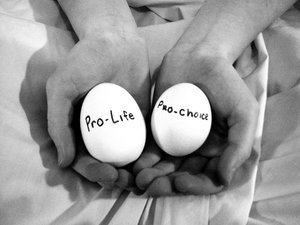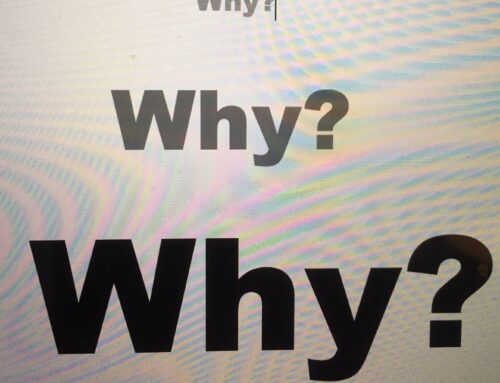
The first tactic is the use of loaded terminology that both sides engage in: specifically, the terms pro-choice, anti-choice, and pro-life. The word choice has a favorable “live and let live” connotation—thus to approve choice, as liberals claim to do, is good; to disapprove it, as liberals accuse conservatives of doing, is bad. The word life is also positive, and to uphold it, as conservatives claim to do, is good; to destroy it, as conservatives imply liberals do, is bad. (The reason conservatives use implication rather than calling liberals anti-life is not that they are more virtuous than liberals, but only less imaginative.)
The second tactic is the incessant liberal chant that conservatives want to impose their ideas about abortion on their neighbors. Discussion and debate, whether on the street corner or in the halls of Congress, is the process by which those on one side of an issue attempt to persuade those on the other side. As long as the debaters focus on why they believe their position is more reasonable, they are acting responsibly and there is no legitimate basis for accusing them of imposing their views. To make such an accusation merely because one disagrees with them, or fears that their views will be reflected in legislation, is dishonest. In a democracy, ideas that are proven sound in debate generally do influence legislation. And that is as it should be. (Would anyone seriously argue for unsound ideas to succeed?)
To be meaningful, any discussion of abortion should reflect three premises: that no one is against choice in general—everyone is for the choices he or she believes are legitimate and against other choices; that the terms used to describe the opposing sides of the issue should be as objective as possible (I would suggest abortion defenders and abortion opponents); and that overstatement is best avoided. With these premises in mind, let’s now turn to the core questions concerning abortion.
Is a fetus a bundle of cells, a “potential human being,” or a human being? This is really a simple question, and the answer is not open to debate, though one wouldn’t know it from the disagreement surrounding the matter. Science provides the definitive answer. It tells us that the genetic code, identifying the individual’s species and distinguishing him or her from all other individuals, is established at conception. So the answer is that a fetus is a human being from the moment of conception. (The term “potential human being” would be appropriate only if history offered an instance of a woman giving birth to something other than a human being—a salmon, say, or a chipmunk.)
Abortion defenders have a response to this argument, of course. They point out that, historically, even the Catholic Church has taken a different view. They note, for example, that Tertullian (160-225 a.d.) approved late term abortion to save the life of the mother; that a number of famous priests and bishops took the same view, including Antoninus (15th century), Antoninus de Corduba (16th century), and Thomas Sanchez (17th century). And they emphasize that for centuries the Church believed the soul enters the fetus at about the fifth month, when movement first occurs in the womb. One contemporary writer, theologian Christine Gudorf, concludes from such facts, “The best evidence is that the Catholic position is not set in stone and is rather in development.”
Such responses are at best silly and at worst disingenuous. They are on a par with saying that the scientific view of whether the sun is the center of our solar system is “in development” because for centuries people took a different view. It is hardly a surprise that primitive medicine resorted to abortion in complicated pregnancies—no other methods were available. Nor is it any less surprising that earlier religious scholars who lacked the guidance of modern science reasoned that the soul—the metaphysical element that includes intellect and will—enters the body long after conception. (It is curious, though, that abortion defenders, who generally loathe the Middle Ages, do not hesitate to turn medieval beliefs to their purposes.)
The question is not how unscientific ages viewed the fetus, but how we who are blessed with genuine scientific knowledge should view the fetus. And the compelling answer is, as a human being. Moreover, we should refer to a human fetus as he or she, never it, because to be human is to deserve the more deferential pronoun.
Is a fetus a person? This question is more difficult. To begin with, it has an ethical dimension and a legal dimension. A fundamental principle of ethics is respect for persons, and in discussions of this principle the word person is generally understood to refer solely to humans. This intimate connection between human being and person can be understood as implying that the two are synonymous; in other words, it affirms that a fetus, being a human being, is also a person. Not every ethicist accepts this reasoning, but religious ethicists and moral theologians generally do because they hold that every human being is “created in the image and likeness of God.”
The legal dimension of the question involves not one but two (sometimes overlapping) perspectives—the philosophical and the practical. Many legal theoreticians would have no problem with the reasoning presented in the previous paragraph. However, those engaged in the interpretation and application of law would be concerned about how defining a fetus as a person would impact the legal system. They would wonder, for example, how the new definition would affect criminal and civil procedures and contract and tort cases. Even more important, they would ask what defining a fetus as a person would mean for the fundamental status of the fetus in law. And the inescapable answer is that it would guarantee the fetus the rights of life, liberty, property, and the pursuit of happiness enjoyed by other individuals and the same legal protection of those rights. The acknowledgement of that guarantee would, in turn, call the validity of decisions such as Roe v Wade into question.
If the fetus is a person, does that mean abortion is never justified? If the abortion is performed to save a woman’s life and no other procedure will do so, it may be completely justified. In traditional Catholic theology, the principle of the Double Effect applies to such cases. The example usually cited is a fallopian pregnancy in which the fetus cannot be dislodged from the tube. The aim of the procedure in this case is to save the woman’s life; the destruction of the fetus is an unintended but unavoidable consequence.
In pregnancies resulting from rape, the issue is more complex. In fact, it is a genuine moral dilemma—a choice between two alternatives, each of which is supported by arguments of equal or very nearly equal soundness. One argument is that rape is such a heinous violation of a woman’s rights that her anguish should not be extended by forcing her to bear the violator’s child. The opposing argument is that the fetus is a person who is innocent of any wrongdoing and should not have his/her right to life denied because of someone else’s offense. Both arguments have merit. Unfortunately, assigning one greater weight has the effect of denying the other. Yet a decision must be made. That is why many who oppose abortion on principle would make an exception in cases of rape.
Pregnancies resulting from incest, though often considered no different from those resulting from rape, can in reality be very different. For example, the case of a 16-year-old who becomes pregnant from consensual intercourse with her brother is different from a younger girl who is seduced by her father. Neither of these cases involves the forcible violation that occurs in rape, so the arguments for/against abortion would be different from those governing rape.
The arguments offered above are a fair representation of the conservative position on abortion. Many people will disagree with them and that is to be expected—the issue of abortion is, after all, controversial. But that said, there is nothing “extreme,” “unscientific,” or “medieval” about the conservative arguments, so to call them that is unfair. Worse, to refuse to consider the arguments as serious contributions to the discussion of abortion not only does a disservice to the people who offer them; it also undermines the integrity of the debate.
There are many consequences to abortion. The ones we hear about most often are those that affect the individuals involved—on the one hand, the woman’s freedom to continue her life without the burden of an unwanted child; on the other, the destruction of an innocent human being. What we seldom hear discussed is the cumulative impact of abortion on society as a whole. Since Roe v Wade was passed, 50 million legal abortions have been performed. (There were, of course, millions of illegal abortions before Roe.) Consider for a moment how much combined human talent that figure represents. How many average hard-working individuals were lost, individuals who would have contributed to the financial and social well being of the country and helped to sustain the health care and retirement systems now struggling to meet the needs of an aging population? How many statesmen and stateswomen were lost? How many physicians, scientists, artists, and humanitarians? How many inventors and entrepreneurs?
Once we have a sense of the immeasurable talent sacrificed to abortion, we can begin to appreciate the tragedy of abortion. Nothing can be done to change the past. But one thing we can do now and in the future, whichever side of the issue we are on, is to discuss the issue of abortion more honestly and with greater respect for one another.
Copyright © 2012 by Vincent Ryan Ruggiero. All rights reserved



